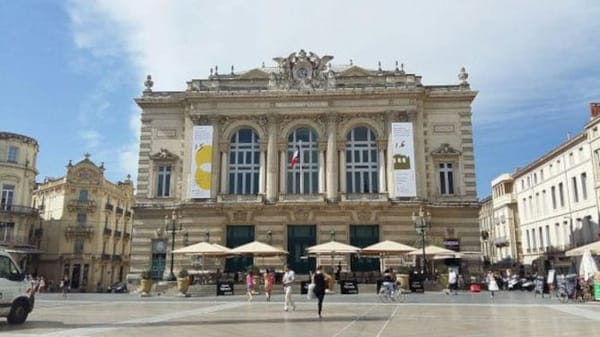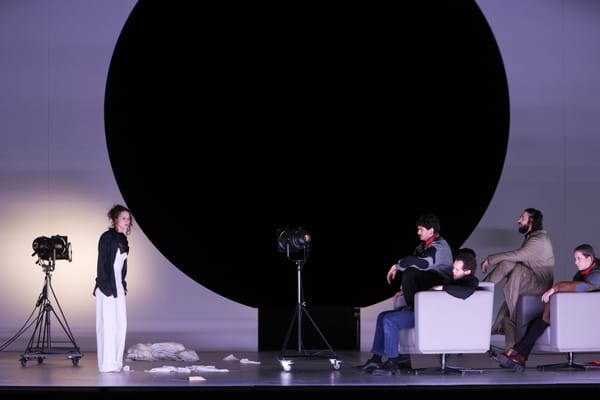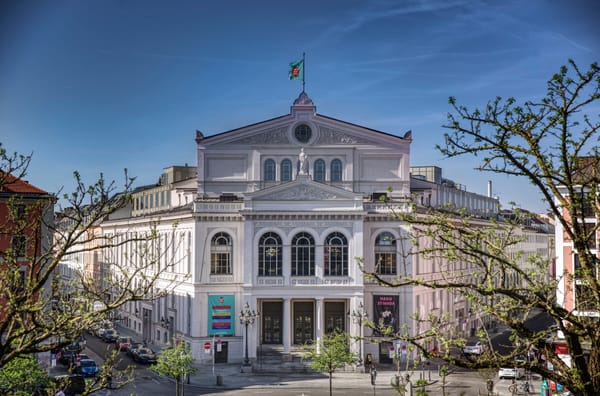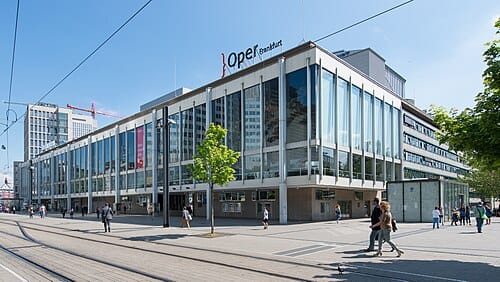London, London Coliseum, RIGOLETTO - G. Verdi, IOCO
COLISEUM - London: RIGOLETTO: When Jonathan Miller’s Rigoletto first opened at English National Opera in 1982, his setting of the opera in a different time and place – Little Italy, New York, in the 1950s - broke with conventionand caused heated controversy. Now in its 14th revival .......
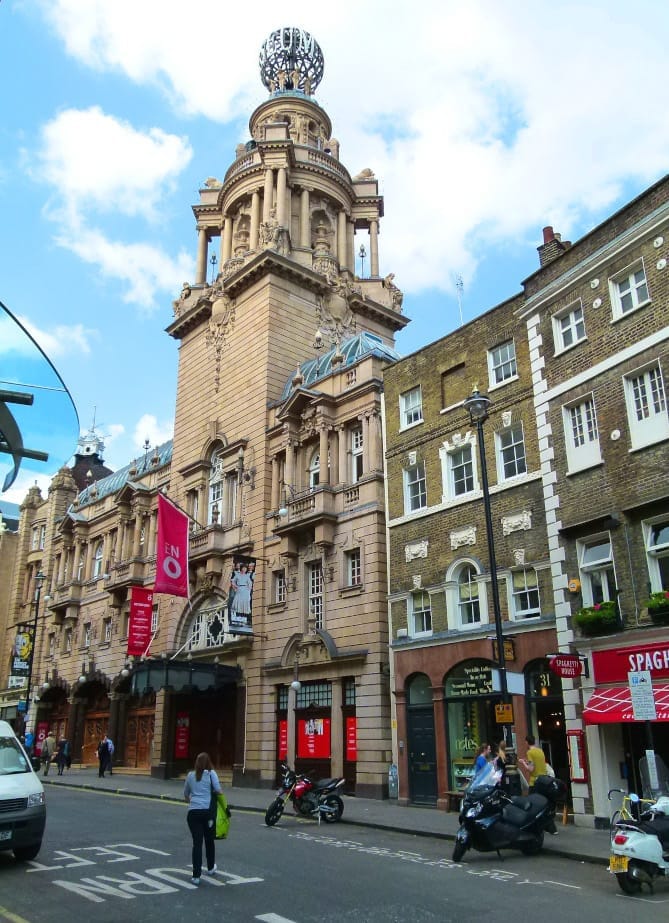
November 14, 2024 - English National Opera, London Coliseum - Richard Farnes - Giuseppe Verdi: Rigoletto - Libretto Francesco Maria Piave, English translation James Fenton
by Janet Banks
Tucked away on St Martin's Lane, near London's Trafalgar Square, the London Coliseum, which opened in 1904, has been the home of English National Opera (ENO) since 1968. Not for much longer, though - it was announced last year that ENO's headquarters will move to Manchester in the next few years. IOCO´s UK correspondent Janet Banks visited it for an iconic production of Verdi's Rigoletto, groundbreaking when it debuted in 1982.
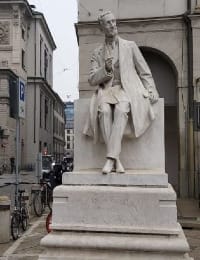
When Jonathan Miller’s Rigoletto first opened at English National Opera in 1982, his setting of the opera in a different time and place – Little Italy, New York, in the 1950s - broke with convention and caused heated controversy. Now in its 14th revival, this iconic production in London can be said to have proved its point.
Following Miller’s death in 2019, Elaine Tyler-Hall returns as revival director, with a truly consummate conductor, Richard Farnes, formerly music director for Opera North, and the three principal soloists all making their ENO (English National Opera) debuts.
Jonathan Miller - Rigoletto youtube WEB STORIES OF REMARKABLE PEOPLE
Rigoletto, no longer a jester, is a wisecracking barman at the mafia headquarters hotel in this production. American baritone Weston Hurt, a regular guest soloist in American opera houses, shone in tthis, his first role in the UK. Wearing a white waiter’s jacket with one sleeve loose and pinned up, his burly figure dominated the stage as he made fun of first Ceprano and then Monterone, widening his eyes so the whites showed all round, to comic effect. His acting was always convincing: in Act I Scene 2 his private side was to the fore with a tenderness and anxiety in his voice as he remonstrated with his daughter Gilda, and the desperate emotion in his baritone as he pleaded with Marullo (Patrick Alexander Keefe) to tell him where she is, trying to appeal to their former friendship, was hard to bear.
The Duke a mafia boss, is sung by Chinese tenor Yongzhao Yu, who made his Metropolitan Opera debut last year. There is a penetrating edge to his voice which carries well and was perfectly suited to the callousness of his character. His love aria at the opening of Act II was more mellifluous. Yu holds the stage well when performing his arias. but his acting was less convincing. The memorable moment in Act III when he taps the jukebox to get it to play La Donna è mobile (or Women Abandon Us, in Fenton’s translation) got its usual laugh, but the aria itself, though admirably delivered, still lacked the tingle factor for me.
Undoubtedly the star of the show was British soprano Robyn Allegra Parton, a regular performer with the Theatre Munster (Münster) in Germany. The freshness of her voice was perfect for the innocent Gilda, with her highest notes pure and unforced and a beautiful crescendo up from pianissimo on the longest and most expressive ones. Her first duet with her father in Act I Scene 2 was exquisitely performed with perfect ensemble, and her top notes when the Duke lightly touched her arms for the first time were breathtakingly rapturous.
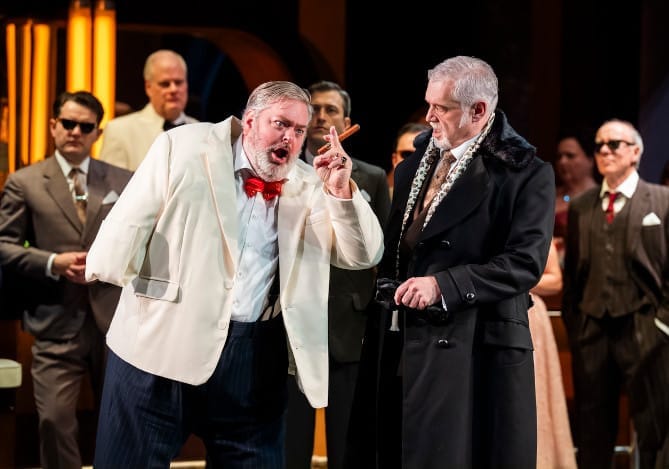
British bass William Thomas was suitably sinister as the hitman Sparafucile, his wonderfully deep tones sounding on even after he left the stage after his first night-time encounter with Rigoletto, and Amy Holyland was a persuasive Maddalena in Act III.
Richard Farnes’ expert direction of the orchestra was pivotal to the musical excellence of the production. The brooding colours he drew from them in the overture, with its low strings and ominous drum rolls effectively set the scene for a brutal tragedy, and the singers were always well supported without being swamped. Designers Patrick Robertson and Rosemary Vercoe must have relished the set-piece of Act I Scene 1, with its 1950s costumes, the women in beautifully coutured party frocks, men of the chorus in dark glasses and the Duke in a shiny silver suit, and the seediness of the alley where Rigoletto and Gilda live with its metal grilled security gates and staircase highlighted the contrast between Rigoletto’s public and private personas.
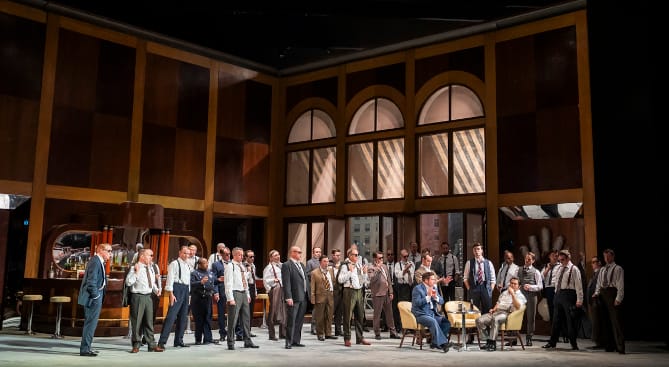
English National Opera go all out to make this production accessible, with their trademark English translations, surtitles, and free tickets for under-21s. Let us hope it bears fruit in providing audiences for the future.


